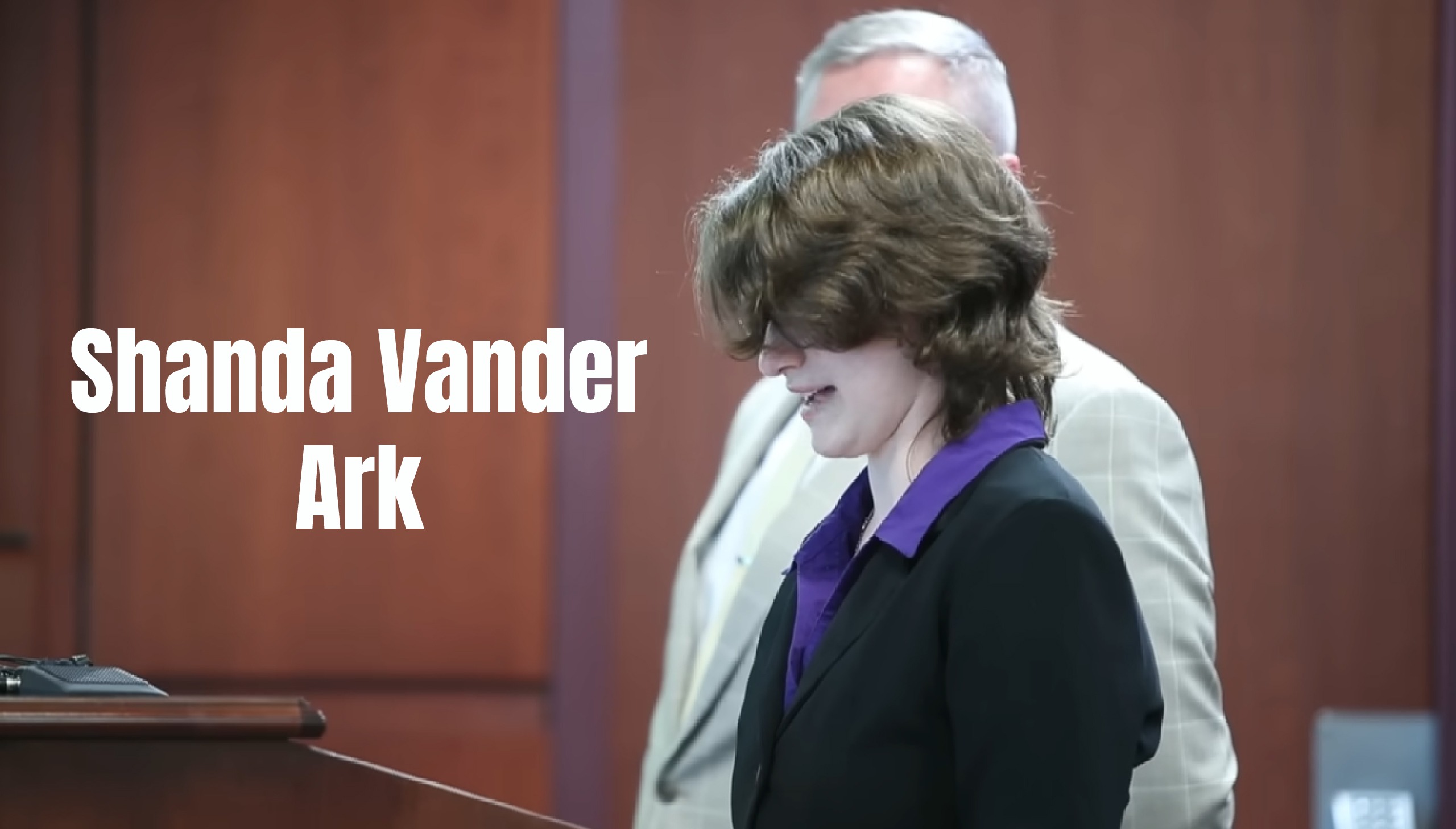The Case of Shanda Vander Ark
Who is Shanda Vander Ark?
Shanda Vander Ark, a name that has become synonymous with one of the most harrowing cases in Muskegon County, Michigan, has once again come under the spotlight. In 2019, Vander Ark was convicted of torturing and ultimately causing the death of her young son, a case that shocked the local community and the nation. Now, years after her conviction, Vander Ark is appealing her sentence and fighting to regain her parental rights—a move that has sparked significant debate and concern among legal experts and the public alike.
Related: Mother Remains Silent as She’s Sentenced to Prison for Torturing Son to Death
Why This Case Matters
The case of Shanda Vander Ark is not just a tragic story of a mother’s unimaginable actions; it also raises critical questions about the legal system’s ability to balance justice with compassion. With the appeal underway, many are wondering whether the court will prioritize the rights of a convicted mother over the well-being of her remaining children and what this could mean for similar cases in the future.
The Larger Context
This case isn’t isolated. It is part of a larger discourse surrounding parental rights, child welfare, and the responsibilities of the legal system. The outcome of Shanda Vander Ark’s appeal could set a precedent, influencing how courts across the country handle cases where a parent convicted of a severe crime seeks to restore their parental rights.
The Tragic Background: A Mother’s Unimaginable Actions
A Devastating Sequence of Events
Shanda Vander Ark’s case is a heartbreaking example of how the safety net meant to protect children can sometimes fail. The tragedy began to unfold long before the courts became involved. Vander Ark, who had a history of mental health issues and substance abuse, was accused of torturing her young son over an extended period. The details that emerged during the trial were both disturbing and deeply saddening. The abuse culminated in his death, a loss that devastated the local community.
Warning Signs and Missed Opportunities
In the lead-up to this tragic outcome, there were several warning signs that could have potentially prevented the situation from escalating. Reports indicate that child protective services had been alerted multiple times about the conditions in Vander Ark’s home. Neighbors and family members had expressed concerns, but the interventions were either insufficient or too late. This raises questions about the effectiveness of child protection agencies and the protocols in place to safeguard vulnerable children.
A Community in Shock
The revelation of these events sent shockwaves through Muskegon County. Residents struggled to comprehend how something so horrifying could happen in their community. The case garnered widespread media attention, with many questioning the systemic failures that allowed such abuse to go unchecked. For many, Shanda Vander Ark became a symbol of both personal tragedy and a broader societal issue—the urgent need for reform in child protection services.
Impact on the Remaining Family
The impact of this tragedy extended beyond the loss of a young life. Vander Ark’s remaining children were left without their mother, who was imprisoned, and their brother, who had passed away. The family was torn apart, with the children placed into foster care or under the guardianship of relatives. The long-term psychological and emotional effects on these children are a grave concern, particularly as they are now at the center of a legal battle over parental rights.
Legal Proceedings: From Conviction to Appeal
The Conviction: Justice Served?
In 2019, Shanda Vander Ark was convicted of multiple charges, including first-degree child abuse and second-degree murder, for the torture and death of her young son. The trial was a harrowing experience for all involved, with graphic evidence and heartbreaking testimonies from witnesses and experts. The jury ultimately found Vander Ark guilty, and she was sentenced to a lengthy prison term, a decision that was seen by many as a necessary step in delivering justice for the young victim.
The Appeal: A Controversial Move
Despite her conviction, Vander Ark has recently initiated an appeal seeking not only to overturn her sentence but also to regain her parental rights. This appeal has sparked significant controversy, as many believe that someone convicted of such a heinous crime should not be allowed to resume a parental role. The appeal process itself is complex, involving multiple legal arguments and considerations, including whether Vander Ark’s initial trial was fair and whether her rights as a parent were adequately considered.
Legal Arguments: The Defense and Prosecution
Vander Ark’s legal team argues that her conviction was based on insufficient evidence and that her mental health issues were not adequately taken into account during the trial. They also claim that the punishment was excessively harsh and that Vander Ark deserves a second chance to prove herself as a mother. On the other side, the prosecution maintains that the evidence was overwhelming and that Vander Ark’s actions were so egregious that she forfeited her right to be a parent.
The Role of Mental Health in the Appeal
A significant aspect of Vander Ark’s appeal centers around her mental health. Her defense team is likely to argue that her mental health issues played a crucial role in her actions and that these issues should be considered as mitigating factors in both her conviction and her bid to regain parental rights. This argument brings to light the broader debate about how the legal system should handle cases involving individuals with severe mental health challenges. Should mental health issues excuse or mitigate responsibility for such severe crimes? And if so, to what extent?
Potential Outcomes of the Appeal
The outcome of this appeal is uncertain and could take several directions. The court could uphold the original conviction and deny Vander Ark’s request to regain her parental rights, reinforcing the idea that certain actions are so severe that they permanently disqualify someone from being a parent. Alternatively, the court could grant a retrial or reduce her sentence, which might lead to a reassessment of her parental rights. Whatever the decision, it will have far-reaching implications, not only for Vander Ark and her remaining children but also for the legal system and similar cases in the future.
Public Reaction and Media Coverage
Community Outrage and Support
The case of Shanda Vander Ark has elicited strong reactions from the public, both locally in Muskegon County and beyond. For many, the thought of a mother who tortured and caused the death of her own child seeking to regain parental rights is deeply unsettling. Public outrage has been palpable, with many community members voicing their anger and disbelief. Social media platforms and local news outlets have been flooded with comments from people who feel that Vander Ark should never be allowed near her remaining children again.
However, not all responses have been negative. Some individuals and advocacy groups argue that everyone deserves a second chance, especially if mental health issues were a significant factor in the crime. They emphasize the importance of rehabilitation and the possibility that Vander Ark could still be a good mother under the right circumstances, particularly if she receives proper treatment and support. This perspective, while less common, highlights the complexity of the case and the difficult questions it raises about justice, redemption, and parental rights.
Media Coverage: A Double-Edged Sword
The media has played a crucial role in shaping public perception of the Vander Ark case. News coverage has ranged from factual reporting on the legal proceedings to more sensationalized stories that emphasize the horrific details of the crime. This type of coverage can be a double-edged sword. On one hand, it keeps the public informed about important developments in the case; on the other hand, it can also contribute to a trial by media, where public opinion is swayed by emotionally charged narratives rather than objective facts.
Impact of Media on Legal Proceedings
The extensive media coverage surrounding this case has also raised concerns about its potential impact on the legal process. High-profile cases like this one often attract significant attention, which can influence everything from jury selection to the final verdict. Legal experts are watching closely to see how the media coverage might affect Vander Ark’s appeal, particularly if the defense argues that she has been unfairly prejudiced by negative press.
The Role of Social Media
Social media has further amplified public reaction to the case, with platforms like Facebook and Twitter serving as forums for heated debates and discussions. Hashtags related to the case have trended locally, and online petitions have been created both in support of and against Vander Ark’s appeal. The speed and reach of social media mean that public opinion can shift rapidly, sometimes based on incomplete or misleading information.
Case Studies: Similar Cases and Their Outcomes
To better understand the potential implications of Vander Ark’s appeal, it is helpful to look at similar cases where parents convicted of serious crimes have sought to regain parental rights. In many instances, courts have been reluctant to restore such rights, particularly when the crime involved the death or severe abuse of a child. However, there have been cases where courts have considered factors such as the parent’s rehabilitation, mental health, and the best interests of the remaining children. These case studies suggest that while Vander Ark’s appeal faces significant challenges, it is not without precedent.
The Implications of Restoring Parental Rights
Balancing Justice and Compassion
The prospect of restoring Shanda Vander Ark’s parental rights raises profound questions about the balance between justice and compassion in the legal system. On one side, there is a strong argument that a parent who has committed such a grievous act—resulting in the death of a child—should permanently lose the right to care for other children. The legal system is tasked with protecting the most vulnerable, and many believe that restoring Vander Ark’s parental rights would contradict this fundamental responsibility.
However, there is also the argument for rehabilitation and the belief that people can change. If Vander Ark’s mental health was indeed a significant factor in her actions and if she has since received treatment and demonstrated a commitment to change, some might argue that she deserves a chance to prove herself as a mother once again. This perspective emphasizes the potential for personal growth and redemption, suggesting that, under the right circumstances, she could be a positive presence in her children’s lives.
The Best Interests of the Children
Central to this debate is the question of what is in the best interests of Vander Ark’s remaining children. Courts are generally guided by this principle when making decisions about parental rights, but in this case, determining what is best for the children is extraordinarily complex. On one hand, they have already endured significant trauma and upheaval, and returning them to their mother could either exacerbate this trauma or provide an opportunity for healing, depending on the circumstances.
Psychologists and child welfare experts often stress the importance of stability, safety, and emotional support for children who have experienced such profound loss. Any decision to restore parental rights would need to be made with extreme caution, ensuring that the children’s needs are prioritized above all else. This might involve closely supervised visitation or a gradual reintegration process if the court were to consider restoring any form of parental rights at all.
Legal Precedents and Future Implications
The decision in Vander Ark’s appeal could set a legal precedent for future cases involving parental rights and serious criminal convictions. If the court sides with Vander Ark, it could open the door for other parents convicted of severe crimes to seek the restoration of their parental rights, potentially altering how such cases are handled in the future. Conversely, if the court denies her appeal, it could reinforce the idea that certain actions are so severe that they permanently sever the parental bond.
Legal scholars and child welfare advocates are closely watching this case to see how it might influence future rulings. The outcome could prompt legislative changes or shifts in how courts weigh the rights of parents against the need to protect children from harm. This case is not just about one family; it has the potential to impact how parental rights are viewed and adjudicated across the country.
Ethical Considerations
Beyond the legal implications, there are significant ethical considerations at play. Is it ethical to restore parental rights to someone who has caused the death of a child, even if that person has undergone significant rehabilitation? What message does that send about accountability and the value of a child’s life? These are difficult questions with no easy answers, and they underscore the complexity of the legal and moral issues surrounding this case.
Potential Paths Forward
As the court deliberates on Vander Ark’s appeal, several potential paths forward could emerge. The court could deny her appeal outright, maintaining the status quo and upholding her original sentence and loss of parental rights. Alternatively, the court could grant a partial restoration of rights, perhaps allowing for supervised visits or other limited forms of contact. A full restoration of rights, while unlikely, is also a possibility, though it would likely be accompanied by significant conditions and oversight.
The Road Ahead: What This Case Means for the Legal System
A Landmark Decision in the Making
The ongoing legal battle surrounding Shanda Vander Ark’s appeal is more than just a singular case; it has the potential to become a landmark decision that could influence the legal landscape for years to come. As the court weighs the arguments presented by both the defense and the prosecution, it must consider not only the specifics of this case but also the broader implications for the legal system and society.
One of the key questions is how the legal system should handle cases involving parents convicted of severe crimes. Should there be a path to redemption and restoration of parental rights, or should certain actions permanently sever the parent-child relationship? The decision in this case could set a precedent that shapes how courts across the country approach similar situations in the future.
The Impact on Child Welfare Policies
Beyond the immediate legal ramifications, this case could also prompt a reevaluation of child welfare policies and procedures. The tragic outcome for Vander Ark’s son and the subsequent legal battles highlight potential gaps in the system that failed to protect a vulnerable child. Policymakers and child welfare advocates may use this case as a catalyst for reform, pushing for stronger protections and more effective interventions when children are at risk.
One potential area of reform could involve the protocols for monitoring and supporting parents with known mental health or substance abuse issues. Ensuring that such parents receive the help they need before a situation escalates to tragedy could prevent future cases like this one. Additionally, the case could lead to discussions about how to better balance the rights of parents with the need to protect children from harm.
Societal Reflections on Justice and Redemption
The case of Shanda Vander Ark also forces society to grapple with difficult questions about justice, redemption, and forgiveness. On one hand, the idea of restoring parental rights to someone who has caused the death of a child may seem unconscionable to many. On the other hand, there is a long-standing belief in the potential for rehabilitation and the possibility that individuals can change and make amends for their past actions.
This tension between punishment and redemption is at the heart of many legal and ethical debates. The outcome of this case could influence how society views these issues, potentially shifting public opinion and legal practices around the treatment of convicted individuals seeking to reintegrate into family life.
The Role of Public Opinion
Public opinion has already played a significant role in shaping the narrative around Vander Ark’s case, and it will likely continue to do so as the appeal progresses. The court’s decision will not be made in a vacuum; it will be influenced by the broader societal context, including the strong reactions and emotions that this case has provoked.
The media, social platforms, and community discussions will all contribute to the ongoing discourse, potentially influencing both the legal process and the court of public opinion. How the public reacts to the final decision will be a critical component of the case’s legacy.
Moving Forward: Lessons and Future Considerations
As the legal proceedings continue, there are several key lessons and considerations for the future. One of the most important is the need for a more robust and proactive approach to child protection. The tragic outcome for Vander Ark’s son serves as a stark reminder of the consequences of systemic failures and the importance of ensuring that all children are safe and supported.
Additionally, this case highlights the complexities of balancing parental rights with child welfare. It underscores the importance of nuanced and careful legal decision-making, particularly in cases involving severe crimes and mental health issues.






